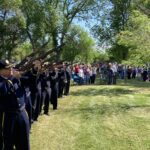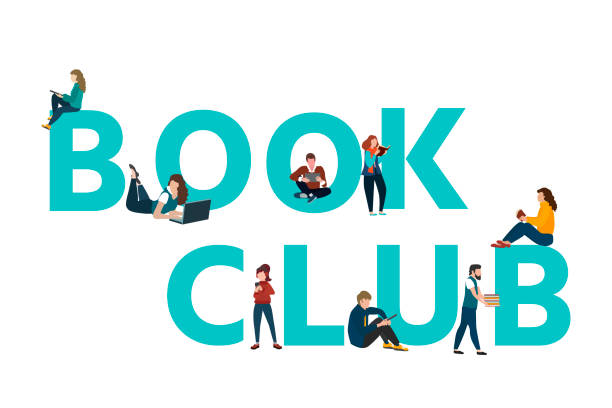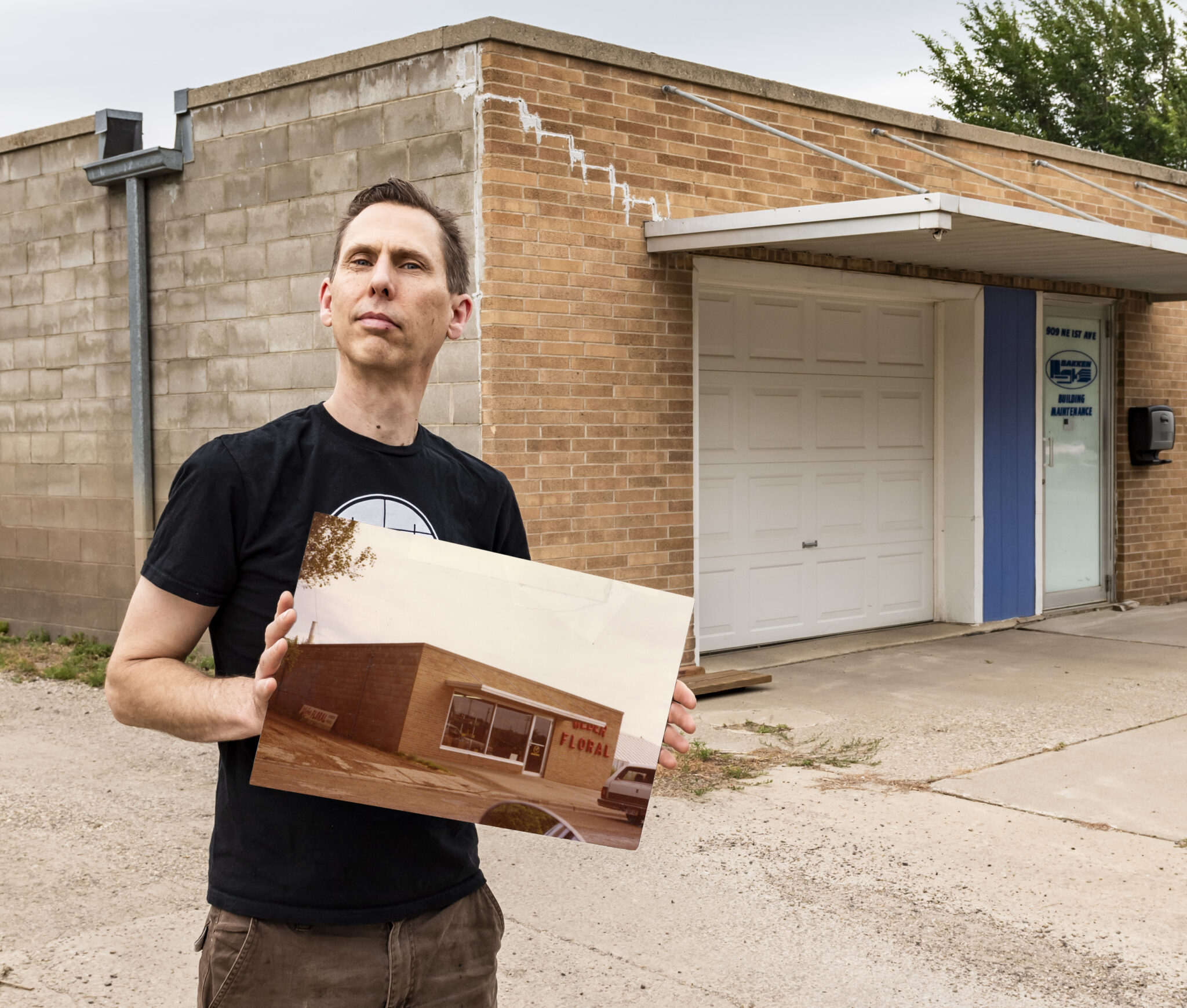

As with many people, my first job was working for my dad. I helped move his law firm from its tiny, hole-in-the-wall office around the corner to a Redfield Main Street storefront. I carried books up from the dungeon-like basement library, pushed them in a grocery cart down the alley, and placed them on the new office’s new shelving. It didn’t take long, but this was before law libraries were digital, when hundreds of 8 x 12 x 3 inch books were more than just backdrops for Yellow Page ads.
Everybody has had a first job. Some jobs have changed little, some have disappeared, and some are partly unrecognizable today. In recognition of Labor Day, Aberdeen Magazine invited many Aberdonians to share first job stories.
Boring and Beautiful
Working for his dad too, attorney and former Regent Harvey Jewett’s first “paycheck-earning” job was in the Jewett Drug warehouse “pulling freight the summer after my seventh-grade year. I also put away returned goods after they had been checked in by others.” Add in “sweeping duty twice a day,” and he was hardly the only respondent to declare his job “mostly boring.”
Not many first jobs are entrepreneurial, but at age 13 Great Plains Bank President Pete Mehlhaff started a popcorn concession operation in 1970. Using profits from selling greeting cards and garden seeds and cashing in a college savings bond, “I purchased an old trailer camper complete with a large popcorn machine.” Before setting up on Eureka’s Main Street, he painted the trailer an “awesome” turquoise, then cleaned up in the City Building’s public bathroom. “As the only turquoise-colored business on Main Street, the custodian easily identified me as the offending party who made the big paint mess in the City bathroom.”
Service: Food and Otherwise
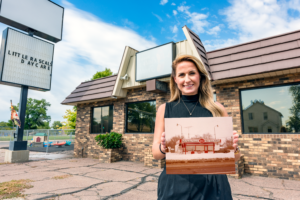
Fallon Helm’s first job was working at the old Dairy Queen.
Like Mehlhaff’s, many first jobs were in food service. “I have always said that everyone should work in a food service industry position to learn both sides of the equation,” observed Kathy Dosch, general manager of Bur-Mar’s Shoes. “It teaches you to be patient and kind when you are being waited on!”
In 1973 at age 13, she started at (the earlier west-side) Dairy Queen serving ice cream for 85 cents an hour. “You memorized the orders,” she recalled. “You added in your head. Cash register was a drawer…., but we knew how to count cash and count it back. A skill, unfortunately, we do not teach very often today.” She also learned customer service: “Older male orders a crème de menthe malt. Had drunk over 3/4 of it. Came back to counter, slapped it down, and said, ‘This is the worst malt ever made.’ We quickly made a new one.”
“The only technology considered in 1997 at Dairy Queen was the cash register and super-efficient drive through,” Fallon Helm, owner of Revive Day Spa & Advantage, remembered, noting some changes after two decades. “Credit cards may have come a few years later.” But, still, “Manually counting money back was required and expected.”
“I dropped a stack of steak plates on my first day,” Jon Reich of Cathexis Partners said about his dishwasher job at Helen’s California Kitchen in 1988. (Here, the hypochondriac reader might want to skip to the next paragraph.) He added, “I occasionally ate food that came back if it looked like it hadn’t been touched.”
Aberdeen Magazine publisher Troy McQuillen first worked at AP Meat Locker “cleaning squished meat and fat off the meat locker floor.” “We were a bunch of teenagers doing jobs wielding knives
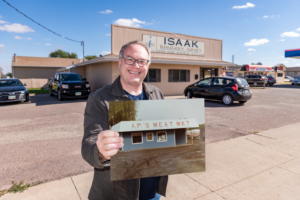
Troy McQuillen’s first job was cleaning at AP Meat Market.
(yes, many bandaids were used), grinding meat, stuffing sausage, delivering eggs and ice, and lots and lots of cleaning. The scariest part of the job was hanging quarters of beef from the John Morrell truck. After hoisting one, they negotiated the slippery route down the truck the ramp into the locker, then lifted the meat for someone to stick a hook at just the right place. “Almost always someone got their finger pinched between the meat hook and the slab o’beef.”
Food service was also a starting place for two state legislators. When the “McDonald’s grill man quit,” State Representative Carl Perry took over and “was one of the first to prepare fast food in Aberdeen.” In 2000, State Senator Michael Rohl started working for his father’s Rohl Beverage at age 9 as merchandiser, truck loader, and repacker. “Every day in the summers, I would ride to work with my dad, then I’d take my bike from the Rohl Beverage warehouse and ride it to Kessler’s, Ken’s, and Econofoods.” He remembers “the looks I’d receive while stacking beer and pop in liquor stores at such a young age.”
Not many service industry jobs were mentioned, but one stands out. Madeline Breidenbach “didn’t plan on going to school and becoming a licensed Funeral Director,” but within a year at Schriver’s Memorial Mortuary & Crematory, she knew she wanted to pursue the career. In 2024, she will become a 23-year-old female licensed funeral director, a rarity in the male-led industry she hopes will change.
Aberdeen Mayor Travis Schaunaman’s first job in Aberdeen was at the Super 8 reservation center answering the reservation calls “with pseudonyms to keep things interesting.” He used “ridiculous names or famous people. Sometimes it would get a rise out of people.”
“Being a college R.A. is always interesting,” Rachel Kippley, Brown County Fair & Park Manager, said about her NSU Resident Assistant job, a variation on the hospitality field. “At the time, alcohol wasn’t allowed in the dorms, and neither were people of the opposite sex. Both can be tough to police when dealing with kids away from home or the first time at the age of 18-22.” On the opposite end of a related industry, my daughter graduated from client to a form of trusty with some supervision over younger children to middle school employee in the at-home day care she attended, then she worked at a school-based operation during high school (when she also worked at a law firm).
Working Outside
Some people talked about their first job after working on the family farm. Schaunaman’s “backbreaking” first job was picking rocks from farm fields by Westport. “I used to load up a huge steel

Aaron Schultz’s first job was at the old Aberdeen Country Club.
trailer with rocks behind a tiny Ford tractor and ride the clutch down the hills to see how fast I could get it going.”
Dacotah Bank chief talent officer Kim Bowman’s first paying job was on the Aberdeen Public Schools summer paint and grounds crew. What might have been mundane “was one of the best summers where I was able to meet some of the best people,” she said.
My son who collected trash for the City agreed that the people, particularly his truck driver, made it fun.
Bowman remembered, “We painted the Simmons Elementary Gym with two stripes around the top. It looked a tube sock!” She also recalled driving a mower from Holgate to Central in traffic. “That got to be very interesting!”
Working in college for the Aberdeen Public Works Department, CO-OP Architecture associate principal architect Spencer Sommers operated a machine called “The Guzzler” and “cleaned out storm sewers (not sanitary sewers… usually).” The work “entailed first sucking everything out of manholes with a giant vacuum.” Then they used a high-pressure hose “that could lift you off the ground” to spray everything down.
Working at the Wylie Park waterslide the first summer it opened in 1983 was Salvation Army case manager Kathy Zerr’s “first job ever and a great experience learning how to work with the public.” Similarly, one of my sons worked at Lee Park Golf Course a couple summers and said it helped him learn to communicate with adults (hmm, thinks his adult father). In addition, Zerr recalled, “Funny things that happened”—for example, “People who didn’t realize their clothes were see-through until they went down the slide.” Intriguingly, they found “interesting things left in the bathroom.” But, apparently, what happens at the waterslide…
United Way of Northeastern South Dakota executive director Aaron Schultz’s first job was ball boy at the old Aberdeen Country Club in the late 1980s. He usually picked balls from the driving range in late evening in grass sometimes “as high as my 12-year-old knees.” Consequently, he’s unconcerned about mosquito-borne diseases, “as the thousands of bites I took during those summer months provided me some type of immunity.” He also dove for balls in the stagnant ponds and mudholes. “I smelled so bad my parents made me ride in the bed of the pickup on the way home, tossed the clothes I was wearing, and forbade me to ever dive for golf balls again!” They also recently “reminded me the smell lingered on me for a few days.”
Recreating
Work inside didn’t always smell better. In high school in 1983, current Northern State University music professor Terry Beckler drummed for a two-man polka band, often getting home after midnight. “Since smoking was allowed in the bars at that time,” he said, “I smelled like the bottom of an ashtray every time. I would immediately throw everything in the wash and shower before going to bed.”
Eric Payne, an agent at Insurance Plus, testified to the unexpected benefits of some jobs. “The Majestic Moose was an indoor golf simulator business that had three simulators and a bar,” he said. “This facility was an excellent idea, but I think it was ahead of its time in Aberdeen. Nights were very slow, so I was able to play a lot of golf myself while working.”
Interestingly, no Parks and Rec coaching, lifeguard, or other jobs were noted, which can have their moments. I remember several from my sons’ coaching jobs, most notoriously when the oldest coached the youngest. My favorite was when the middle son coached tee ball, and the four-year-old “pitcher” held his coach’s hand when they walked off the field between innings.
Insurance Plus agent Courtney Hostetter started at SkateAway in 1999 at 15 as a skate guard (like a lifeguard on skates). She remembered, “Rob [Brandner] saying during an employee meeting that no matter what a person comes up to the concession stand for, even if it’s to trade a dollar bill for four quarters, you ALWAYS tell them ‘Thank you!’” Another lesson is “Granny Coyle saying ‘If you’ve got time to lean, you’ve got time to clean.’”
Tales of Retail
Retail is another popular first job industry. Red Rooster owner Dan Cleberg started in delivery for Weber Floral after graduating from high school. “I got to drive the van around town,” he said,
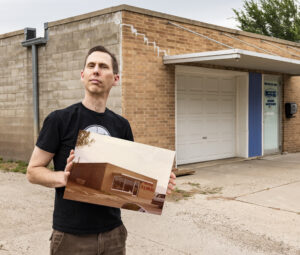
Dan Cleberg’s first job was delivering for Weber Floral.
admitting he often got lost because “We didn’t have GPS back then.” Later in the summer, Cleberg wanted to spend days at the lake and a friend with a night job wanted to party, so they decided to swap jobs. “He came over and took my job,” Cleberg recalled, but apparently the friend “hadn’t filled in his employers about the plan,” and the job was gone.
In 1990 at age 14, Angelhaus owner/CEO Nathan Gellhaus worked part-time at Nelson Auto and Electric. “I delivered auto parts to repair shops around Aberdeen and managed inventory in between deliveries,” he said. Rick Giovannatone, the owner, “tells me I was a pretty good employee despite my young age.” As Gellhaus remembered, however, “the day he asked me to rearrange the lawnmowers still boxed up in the showroom with the forklift didn’t go so well. I’m not sure how much a 10×10 glass showroom window costs, but I’m sure Rick could tell you.”
Starting out in what is now a nearly extinct retail business, Julie Fischbach, owner of Mainstream Boutique and The Finery on Main, worked at the Musicland record store, one of the original stores in the Lakewood Mall when it opened in 1990. “Customers would call or stop in and hum something and expect us to know what song it was,” she said. Speaking of extinct: “This time period is when VHS and cassette tapes were very popular. Now my daughters don’t even know what they are!”
Changing Jobs
Like the above, many first jobs don’t look as they once did. Katie Washnok, owner/operator of Blackout Ind., grew up in a family auction business. She noted that sale bills, along with photos of auction items, included auctioneers’ pictures. “There was my grandfather, my uncle, my mom as head clerk, my grandma as head cashier—and three-year-old me as sheet runner.” She ran the clerking sheet from her mother in the auction trailer to her grandmother in the camper. While “technology has made the position obsolete,” due to the company’s lack of technology, she joked, “they would still require a sheet runner!”
Winner of the antique job words award, Ruth Logan, of South Dakota Rehabilitation Services, started as a computer operator at Hub City, Inc. in 1989, where she “put reel-to-reel tape to back up the computer.” Say what? “Then when I was the secretary, I had to copy blueprints onto a large Xerox machine and send them in to get put onto microfiche cards.”
In high school, former Johnson Motors owner Rolf Johnson worked for the family dealership doing required vehicle safety inspections until the state eliminated the requirement in 1978. He disagrees with that decision. “I believe that we need these inspections to be done today,” he said because vehicle owners can let maintenance slip, “causing hazardous conditions not only for the driver but other vehicle owners.”
Former Mayor Mike Levsen came to Aberdeen in 1967 to attend Northern and worked at KSDN radio in a job that may have stayed the same as much as it’s changed. He was a “’disc jockey,’ as it was termed: playing records, reading news, reporting weather, sports, commercials, etc. Much of that still exists, with the obvious technology effects.” One-time colleague Doc Sebastian of Hub City Radio recalled to Aberdeen Magazine that today computer preprogramming allows him to be simultaneously on the air on two stations and on the golf course at the same time.
Never Forget Your First
Everybody has a first job, and its impact on your career is basically what you make of it. Kim Bowman, whom we last saw driving a mower down Dakota Street, looks at the role of first jobs as a human resources professional. Particularly for young people out of high school looking for either full-time or college jobs, early work experience “shows they have initiative to do more. It also allows us to learn more about them and ask questions about what they learned from that experience.” But times have changed. Students don’t all have time for a job in high school or college due to increased opportunities in academics, sports, fine arts, volunteerism, or other activities. “We would look at those experiences as we would if they were typical jobs,” she adds. “Our youth have the opportunity to learn a lot of transferable skills being involved in those activities that would add value to any organization.”
Despite the humor in many recollections of early jobs, there was often affection and appreciation. Many would likely agree with Fallon Helm’s conclusion that her Dairy Queen job “set the standard for a work ethic sure to pay off.” Forgettable jobs, maybe, but not forgotten. //











